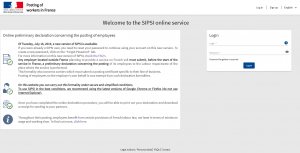Posted employees from the EU
Thématiques
Date de mise à jour
For social security purposes, a seconded employee is one who has been sent by a foreign-based employer to perform a temporary assignment in France.
The chain of command between the employee and the employer is maintained during the assignment in France. Under certain conditions, the employee may be covered by the social security system of the country in which they usually work. In such cases, social security contributions are paid in the individual’s country of origin.
Employees who are posted to France and usually work in a member state of the European Union or the European Economic Area continue to be covered by the social security system of their home country. To work in France, other formalities are required for citizens of nations that are not part of the EU, EEA or Switzerland.
| Helpful tip : When an employee is posted in France, regardless of their nationality, a secondment declaration must be submitted by the foreign-based employer using the online “Sipsi” service of the Ministry for Labour.
|
Requirements
They are classed as a seconded or posted employee if the following conditions are fulfilled:
- A significant proportion of the employer’s business is run in the member state in which it is established.
- The chain of command between an employee posted to France and the employer is maintained during the assignment.
The employee has been posted to France to perform a role on the original employer’s behalf.
The employee must be:
- A citizen of a member state of the European Union or European Economic Area, or Switzerland; or
- A citizen of a third-party state who usually works for an employer registered in the European Union, the European Economic Area or Switzerland.
If these conditions are fulfilled, the employee is granted seconded employee status.
If this is not the case, the employee posted in France must be registered with the French social security system. Contributions will be paid in France.
Being seconded to overseas departments and regions
The overseas departments (Guadeloupe, French Guiana, Reunion Island, Martinique and Mayotte), though geographically located outside the European area, have the status of Outermost Regions (ORs) with respect to the European Union.
In this respect, Community regulations, including those relating to the posting of employees, apply subject to the same conditions as in mainland France.
Posting duration
These intra-community employees may be posted for a maximum of 24 months.
An extension of the secondment period may be granted in the event that the planned duration of the assignment exceeds 24 months or if it needs to be extended beyond 24 months. The secondment period’s extension will only be granted in exceptional circumstances subject to approval from the foreign organization and the Center of European and International Liaisons for Social Security (CLEISS).
For further information, visit the CLEISS website and view the EU Council video.
Rights of posted employees
Intra-community employees posted in France will benefit from medical and maternity coverage in the country for the duration of their posting, in the same way as any other individual registered with French social security.
To ensure that any medical expenses they incur in France are covered, they must register with French social security.
Family members accompanying employees posted in France (spouse or partner, children under 18) can also benefit from this coverage if they reside in the country during the posting period.
In practice
- Employer: Informs the relevant organization in the country of origin from which the employee has been posted.
- Employer: Requests A1 form “certificate attesting to the social security legislation applicable to the holder”. Form A1 attests to the social security legislation that is applicable to its holder.
- Employee: Requests S1 form “certificate of entitlement to social security coverage” from the relevant social security institution in their usual country of residence.
- Employee: Sends document S1 to the Primary Health Insurance Fund (CPAM) of their place of residence in France as soon as they arrive in the country. Form S1 enables seconded employees to register with French healthcare institutions when they are covered by another member state’s social security system.
- The relevant CPAM will register the holder of an S1 document to the French social security system: the seconded employee and the members of their family will have their medical expenses reimbursed (medical treatment, hospitalization, etc.) in the same way as a French worker covered by France’s General Social Security system.
- Secondment extension: The employer sends the request to the relevant organization in the country from which the employee has been posted. The latter must consult the CLEISS.
Moving within Europe


